This is the third and final part of my review of the five-day festival. The first two parts are here and here.
Sunday was something of a Ladies’ Day, with six out of the eight main stage acts featuring female lead singers. First of these were the seven-piece T Clemente band, who’s flown all the way from San Francisco at their own expense to play the festival. Their tight and polished West Coast AOR sound made a very strong impression for an opening act, and left the impression we’ll be hearing more of this band in the future.
With a catsuited singer who goes under the name of “The Duchess”, Space Elevator had a very dramatic visual appeal, and had the music to back it up too, with a great hard rock AOR sound. Alongside original numbers about obsessive-compulsive disorder, being dumped, and love letters to Doctor Who, they threw in excellent covers of Thin Lizzy’s “Don’t Believe a Word” and Aerosmith’s “Love in an Elevator”. Perhaps their only flaw was their use of too much programmed keys rather than having a flesh-and-blood keyboard player in the band.
Making a welcome return after their superb performance on the same stage in 2014, Norway’s The Windmill were the most Prog band of the day; with a flute and a steampunk-dressed keyboard player their music is soaring, melodic and epic with the focus on symphonic composition rather than instrumental virtuosity. Alongside a lengthy new number their set drew heavily from “Continuum”, although sadly there wasn’t time for the 24-minute “The Gamer”. All heady stuff and ticks all the right boxes for the hardcore prog fans.
The Heather Findlay Band were eagerly anticipated. They’ve gone through some changes from the band that toured in April, with former Cloud Atlas man Martin Ledger taking over on lead guitar, Touchstone’s Henry Rogers taking over on drums, and the band slimmed down to a six-piece without a rhythm guitarist. From the performance they delivered you’d never have guessed this was the first live appearance of this full lineup. They combined highlights from Mantra Vega’s “The Illusion’s Reckoning” with older Mostly Autumn standards and a couple of rocked-up Odin Dragonfly numbers. Losing the rhythm guitar didn’t seem to leave holes in the sound; Angela Gordon’s keys took a bigger role, and Heather played acoustic guitar on some songs. On “Caught in a Fold” Sarah Dean took over on keys while Angela played the flute parts. One thing that’s notable about the various incarnations of Heather’s band is the way they totally reinvent the songs to fit the instrumentation of the current band. Martin Ledger proved an inspired choice as guitarist, nailing the guitar parts on both the Mantra Vega songs and the older Mostly Autumn material. One surprise was a very powerful “Unoriginal Sin”, which didn’t feature in the April tour, with Heather playing keys. An epic Carpe Diem and the spiralling title track of The Illusion’s Reckoning bought the very strong set to a close.
Purson seem on the cusp of far bigger things. Their take on late sixties psychedelic rock has long been embraced by the underground prog scene, but they’ve been making waves of late in more mainstream waters. They’ve a band with a look that exactly matches their sound, as if they’ve all stepped out of a time machine from 1969, complete with the right vintage guitars. Rosalie Cunningham on lead vocals and lead guitar is the focus, playing raw and dirty riffs and reeling off solos with heavy use of the wah-wah pedal. Despite the brief interruption of a collapsing keyboard stand, they delivered a very powerful set. It does leave you wondering how much longer we’ll still be able to see this band on stages like this.
It’s been a long, long time since Odin Dragonfly have played anything other than the occasional very short support set, so their appearance on Stage Three was a rare chance to see Heather and Angela together as an acoustic duo., the two of them playing their second set of the day. Compared to the rock dynamics on the main stage this was beautiful chill-out stuff with minimal instrumentation, and the emphasis on the vocal harmonies. There were moments when they came over a little under-rehearsed, especially the stripped-down take on Mostly Autumn’s “Evergreen”, but it was still an enjoyable set, with songs from the 2007 album “Offerings” alongside stripped-down versions of Mostly Autumn’s “Eyes of the Forest” and “Bitterness Burnt”, and a new song which might even end up on a long-awaited follow-up to “Offerings”.
The clash with Odin Dragonfly meant I only caught the end of Curved Air’s set, but from what I saw it seemed like the tail end of a barnstorming set, with two of the biggest hits right at the end, “Back Street Luv” as the closer. With so many progressive-leaning bands with female lead singers on the bill over the course of the weekend it’s fitting Curved Air were one of them. Sonya Kristina is an absolute legend and still in fine voice. And they’re yet another reminder that progressive rock needs more violins.
Mostly Autumn are a fixture in this festival, having played every year since at least 2008, and the weekend somehow wouldn’t be the sane without them. Despite having seen the band more than a hundred times, they still retain the capacity to astound. They began as on their spring tour, with the instrumental “Out of the Inn” which starts as a celtic-folk jig centred on Angela Gordon’s flute, and develops into a hard rock workout, before Olivia Sparnenn made her customary dramatic entrance for “In for the Bite”, a song from the recently-released Josh & Co album. Much of the early part of the set was hard-rocking numbers from the recent albums since Olivia took over as lead singer, with “Skin on Skin” showcasing Alex Cromaty’s remarkable drumming. In contrast, the beautiful stripped-back balled “Silhouette of Stolen Ghosts” was a change of pace. The came a truly epic version of “Mother Nature” performed with an exceptional intensity even by their standards. The obligatory closer “Heroes Never Die” ought to have been worn smooth by over-exposure by now, but even that packed a powerful emotional punch.
It wasn’t easy for headliners Focus to follow that. Like Curved Air they’re a legendary band who are regulars on the festival circuit, but with their two biggest hits quite unlike the rest of their material they can come over as marking time until the hits at the end. But Focus do what they do, and the chilled-out jazz-rock workouts like the lengthy “Eruption” deserved to be appreciated on their own merits. But after the slow start, “Sylvia” and “Hocus Pocus” came as expected at the end, and the festival finished in a frenzy of air-guitar and yodelling, and so it should.
This weekend turned out to a good candidate for the best CRF yet. The bill was a great mix of old favourites and new discoveries. The old favourites showed everyone why they keep getting invited back, and newer bands rose to the big occasion. The main stage bill across Saturday and Sunday was remarkable in its consistent quality this year; there are plenty of acts who’d played earlier years who would have seemed out of place this year.
While some higher profile festivals this year had bills heavy with heritage acts (HRH Prog and Ramblin’ Man, I’m looking at you), it was good to see representatives of the current generation of bands making up the bulk of the bill. It was also good to see so many women on the bill; can you imagine Glastonbury or Reading featuring six female frontwomen out of eight acts?




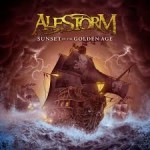 “Scottish Pirate Metal” doesn’t seem like an idea strong enough to last for four albums without the concept wearing thin, but Alestorm seem far from reaching the point of diminishing returns. Like their previous albums, it’s filled with tales of nautical adventure and booze set to music with a strong folk-metal flavour, though “Wooden Leg” is close to punk. It’s all entertaining stuff that doesn’t take itself remotely seriously, which is precisely what metal should be.
“Scottish Pirate Metal” doesn’t seem like an idea strong enough to last for four albums without the concept wearing thin, but Alestorm seem far from reaching the point of diminishing returns. Like their previous albums, it’s filled with tales of nautical adventure and booze set to music with a strong folk-metal flavour, though “Wooden Leg” is close to punk. It’s all entertaining stuff that doesn’t take itself remotely seriously, which is precisely what metal should be.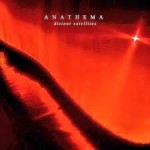 Aside from the occasional dance/electronica touches Anathema continue in a similar vein to last year’s “Weather Systems”. Their emotional widescreen music combines a big sound with a minimalist approach to songwriting, using the power of repetition to create something that’s often more than the sum or it’s parts. The great mystery is why mainstream crossover recognition continues to elude them and they’re still relatively unknown outside of the prog scene.
Aside from the occasional dance/electronica touches Anathema continue in a similar vein to last year’s “Weather Systems”. Their emotional widescreen music combines a big sound with a minimalist approach to songwriting, using the power of repetition to create something that’s often more than the sum or it’s parts. The great mystery is why mainstream crossover recognition continues to elude them and they’re still relatively unknown outside of the prog scene.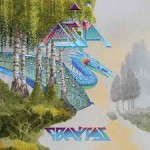 Not many people would have expected a 1980s supergroup made up from 70s prog musicians to still be making albums in 2014. They’re now down to a trio of original members plus young guitarist Sam Coulson, not even born when the band first started. This is really John Wetton’s album; he’s on superb form vocally, with big soaring melodies throughout. It’s a far better album than Yes’ lacklustre effort.
Not many people would have expected a 1980s supergroup made up from 70s prog musicians to still be making albums in 2014. They’re now down to a trio of original members plus young guitarist Sam Coulson, not even born when the band first started. This is really John Wetton’s album; he’s on superb form vocally, with big soaring melodies throughout. It’s a far better album than Yes’ lacklustre effort. The Polish black metal band recorded this album just after mainman Nergal was given the all-clear in his battle against cancer. The resulting record is a heavy, intense and deeply spiritual work, which makes Satanism sound like an actual religion. A vastly better album than anything Venom could have imagined, let alone made.
The Polish black metal band recorded this album just after mainman Nergal was given the all-clear in his battle against cancer. The resulting record is a heavy, intense and deeply spiritual work, which makes Satanism sound like an actual religion. A vastly better album than anything Venom could have imagined, let alone made.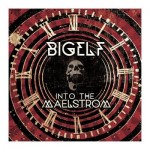 An album where the title is a perfect description of how the music sounds. Bigelf combine the melodic ear of The Beatles, the hand of doom of early Black Sabbath, the theatricality of The Crazy World of Arthur Brown, the musical ambition of 70s King Crimson, and the lack of inhibitions of Queen. This record captures the intensity of their live experience in a way their previous albums never quite managed.
An album where the title is a perfect description of how the music sounds. Bigelf combine the melodic ear of The Beatles, the hand of doom of early Black Sabbath, the theatricality of The Crazy World of Arthur Brown, the musical ambition of 70s King Crimson, and the lack of inhibitions of Queen. This record captures the intensity of their live experience in a way their previous albums never quite managed.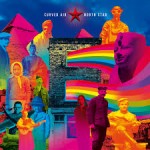 Curved Air reformed a few years back and have been playing the festival circuit for a while, but North Star is their first studio recording since the 1970s. With their quirky but fluid jazz-rock they’ve picked up exactly where they left off decades before, and Sonja Kristina is still on superb form vocally. The only thing that lets it down are some unnecessary covers, though they do demonstrate that they’re better songwriters than Snow Patrol.
Curved Air reformed a few years back and have been playing the festival circuit for a while, but North Star is their first studio recording since the 1970s. With their quirky but fluid jazz-rock they’ve picked up exactly where they left off decades before, and Sonja Kristina is still on superb form vocally. The only thing that lets it down are some unnecessary covers, though they do demonstrate that they’re better songwriters than Snow Patrol. Elbow are one of those mainstream rock bands that owe a huge debt to 70s progressive rock, which is obvious if you listen beyond their hits. Peter Gabriel is clearly an influence on Guy Garvey’s vocals and composition, and Elbow sound like the band Genesis might have become if Hackett had left but Gabriel had stayed. Even though it might have benefited from a solo or two in the right places, it’s still a rich and ambitious record with a great amount of emotional depth.
Elbow are one of those mainstream rock bands that owe a huge debt to 70s progressive rock, which is obvious if you listen beyond their hits. Peter Gabriel is clearly an influence on Guy Garvey’s vocals and composition, and Elbow sound like the band Genesis might have become if Hackett had left but Gabriel had stayed. Even though it might have benefited from a solo or two in the right places, it’s still a rich and ambitious record with a great amount of emotional depth.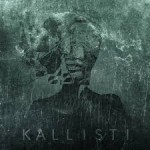 EYE are a multinational prog-metal band based in Dubai, with members from the Middle East, India and Eastern Europe, and this impressive work with shades of Anathema, Opeth, Porcupine Tree and Godspeed You Black Emperor is quite remarkable for a début with its mature composition and strong use of dynamics.
EYE are a multinational prog-metal band based in Dubai, with members from the Middle East, India and Eastern Europe, and this impressive work with shades of Anathema, Opeth, Porcupine Tree and Godspeed You Black Emperor is quite remarkable for a début with its mature composition and strong use of dynamics.